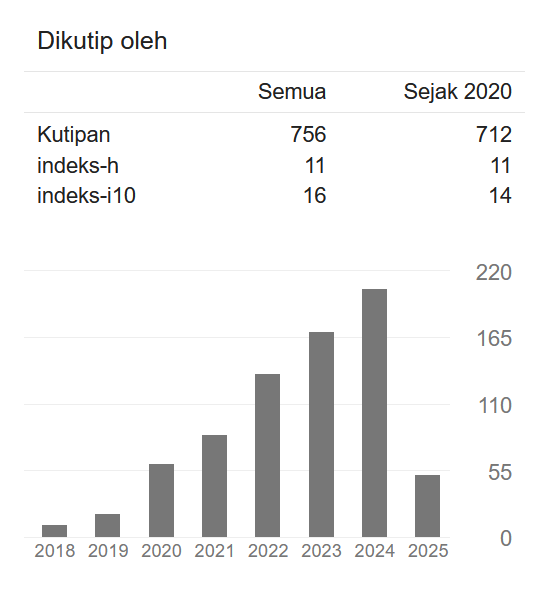Symbolic Interaction and the Art of Islamic Communication: A Strategic Approach to Education
DOI:
https://doi.org/10.19109/medinate.v21i2.28492Keywords:
Islamic Communication, Symbolic, Islamic Values, Globalisation, Digital MediaAbstract
This article explores communication strategies based on symbolic interactionism theory in the context of Islamic values education, particularly in facing the challenges of modernisation and globalisation. In Islamic education, communication plays an important role as a means of conveying and internalising values that shape the character, ethics, and worldview of students. Using a literature review approach, this study analyses how symbolic interactionism, which focuses on meaning-making through social interaction, can be applied to develop effective educational communication strategies. The findings indicate that interpersonal communication, group discussions, and the use of digital media are the main strategies that align with the symbolic interactionism framework. This approach enables educators to connect meaningfully with students, taking into account their social backgrounds and individual identities. By emphasising symbols, shared meanings, and personal involvement, Islamic educators can foster a deeper understanding and stronger commitment to Islamic values. This approach not only supports character development but also prepares students to navigate the global world without losing their religious identity. This study underscores the importance of adaptive and value-based communication strategies in enhancing the relevance and impact of Islamic education in the contemporary era.
References
Abdillah, I., & Nugraha, L. (2024). STRATEGIES FOR INNOVATIVE LEARNING BASED ON ISLAMIC VALUES IN THE DIGITAL ERA. Proceedings of the International Conference on Education, Society and Humanity, 02(02), 841–851. Retrieved from https://ejournal.unuja.ac.id/index.php/icesh%0ASTRATEGIES
Bucky Wibawa Karya Guna, Sri Endah Yuwantiningrum, Firmansyah, Muh. Dzihab Aminudin S, & Aslan, A. (2024). Building Morality and Ethics Through Islamic Religious Education in Schools. IJGIE (International Journal of Graduate of Islamic Education), 5(1), 14–24. https://doi.org/10.37567/ijgie.v5i1.2685
Busetto, L., Wick, W., & Gumbinger, C. (2020). How to use and assess qualitative research methods. Neurological Research and Practice, 2(1). https://doi.org/10.1186/s42466-020-00059-z
Diana, A., Azani, M. Z., & M, M. (2024). the Concept and Context of Islamic Education Learning in the Digital Era: Relevance and Integrative Studies. Profetika: Jurnal Studi Islam, 25(01), 33–44. https://doi.org/10.23917/profetika.v25i01.4239
Dwivedi, Y. K., Ismagilova, E., Hughes, D. L., Carlson, J., Filieri, R., Jacobson, J., … Wang, Y. (2021). Setting the future of digital and social media marketing research: Perspectives and research propositions. International Journal of Information Management, 59(June 2020), 102168. https://doi.org/10.1016/j.ijinfomgt.2020.102168
Farchan, Y., & Rosharlianti, Z. (2021). The Trend of Hijrah: New Construction of Urban Millennial Muslim Identity in Indonesia. The Sociology of Islam, 4(2), 182–205. https://doi.org/10.15642/jsi.2021.4.2.182-205
Junaedi, J., Zainuddin, M., Walid, M., Hasanah, M., & Barizi, A. (2024). Enhancing Transformative Competencies through the Internalization of Religious Moderation: A Vision for Islamic Boarding School’s Educational Framework in 2030. AL-ISHLAH: Jurnal Pendidikan, 16(2), 2692–2704. https://doi.org/10.35445/alishlah.v16i2.5367
Kurniawati, W., & Fatimah, M. (2024). The Role of Islamic Religious Education Teachers in Instilling Character Values in Students at SMAN 1 Ngemplak. Didaktika: Jurnal Kependidikan, 13(001), 469–478. Retrieved from https://jurnaldidaktika.org
Lim, W. M. (2024). What Is Qualitative Research? An Overview and Guidelines. Australasian Marketing Journal, 131. https://doi.org/10.1177/14413582241264619
Masturin, M. (2023). Development of Islamic Religious Education Materials Based on Religious Moderation in Forming Student Character. Munaddhomah: Jurnal Manajemen Pendidikan Islam, 3(4), 246–355. https://doi.org/10.31538/munaddhomah.v3i4.310
Qur, B. (2025). The Role of Islamic Values in Building a Generation with Noble Morals. Jurnal Iman Dan Spiritualitas, 5(2), 213–224. https://doi.org/https://doi.org/10.15575/jis.v5i2.4461
Rohman, Roibin, Barizi, A., Walid, A., & Akbar, F. (2025). Maintaining Islamic Values in the Modern World : The Role of Informal Education and Socio-Cultural Dynamics in Rural East Java. Al-Ishlah: Jurnal Pendidikan, 17(1), 1377–1386. https://doi.org/10.35445/alishlah.v17i1.6645
Rustamana, A., Adillah, P. M., Maharani, N. K., & Fayyedh, F. A. (2024). Qualitative Research Methods. Indonesian Journal of Interdisciplinary Research in Science and Technology (MARCOPOLO), 2(6), 919–930. https://doi.org/https://doi.org/10.55927/marcopolo.v2i6.9907
Shabur, M. A., & Siddiki, M. R. (2024). Investigating social media’s impact on the new era of interactive learning: A case study of Bangladesh. Heliyon, 10(4), e26234. https://doi.org/10.1016/j.heliyon.2024.e26234
Siahaan, A., Ahkas, A. W., & Pulungan, S. H. (2022). Internalization of Islamic Values in Students in Learning Islamic Religious Education. AL-ISHLAH: Jurnal Pendidikan, 14(4), 5769–5780. https://doi.org/10.35445/alishlah.v14i4.1034








